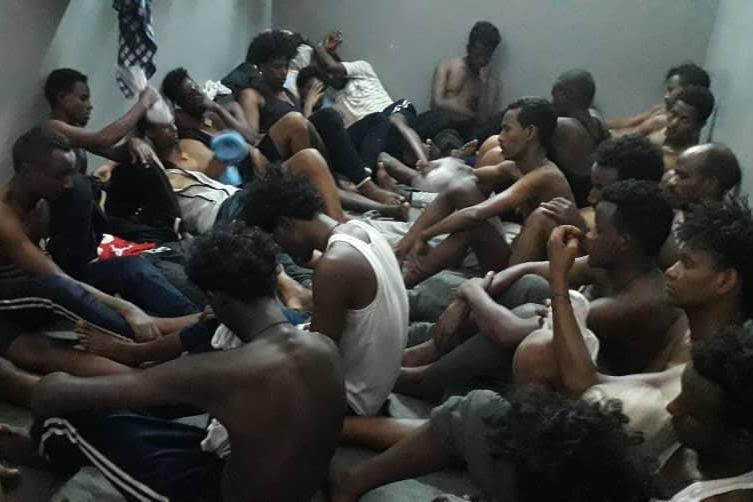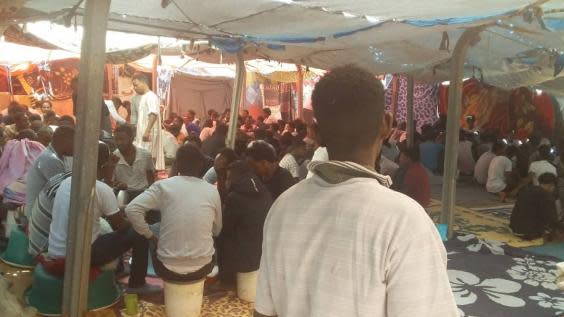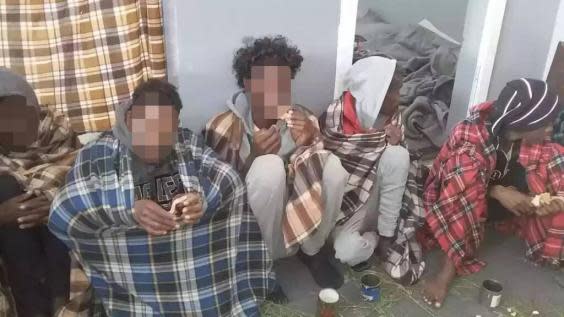‘Left to rot’: Inside Libya’s squalid detention centres where migrants and refugees suffer a ‘slow death’

The refugees sleep in shifts, 25 of them crushed together in a tiny room-turned-prison like knives in a cutlery drawer. There isn’t enough space for everyone to lie down at the same time.
They share a single toilet, which is a putrid hole in the ground, and say they have not seen the sun in a year. All have been tortured along their journey through treacherous deserts.
Speaking to The Independent via phones smuggled into the squalid cells, the Eritrean refugees said of all the terrible years they have spent in war-torn Libya, 2020 has been the worst.
“We are experiencing torture and abuse, there is no way for us to escape and save our lives,” says Jemal, 30, who fled arrest in Eritrea in 2017, leaving his wife and child behind. “No one can imagine the nightmare we live through,” he adds.
Despite Jemal registering an asylum claim with the UN refugee agency (UNHCR) back in 2017, this month marks two years of being held in this particular government-run centre, outside the city of Zintan, along the Western Libyan plateau just southwest of Tripoli. There are over 400 people, including women and children, from Eritrea, Somalia and Sudan crammed in the overflowing facility.
The UNHCR has acknowledged that because of increased restrictions on the movement of aid workers, the coronavirus pandemic and the latest iteration of the country’s civil war, they have lost access to this detention centre and several others in February. There have been just two brief visits from other aid agencies despite deteriorating conditions.
Officials from the UN’s migration agency (IOM) agreed that this has been the worst year so far for the hundreds of thousands of refugees and migrants in Libya because of the conflict and the punishing constraints halting the lifesaving work charities can do.
Amid the chaos and uptick in violence, 5,000 migrants, who were intercepted in the Mediterranean and brought back to Libya, are missing.
“We have been tortured and experience abuse, we do not get enough water and live off a single meal of pasta a day. We live in one crowded room, in terrible conditions,” Jemal continues, explaining that he had originally paid smugglers in Libya $5,000 (£3,760) to get to Europe by sea. Instead of boarding a rickety boat, he and others were held for three months by smugglers in the coastal town of Sabratha and tortured for money including being chained, flogged, stripped and left outside in the punishing heat.
Since then, he says he has nearly been killed when caught in the crossfire of three separate bouts of inter-militia fighting. He was rescued from the smuggler camp by a rights group in 2017 when a battle broke out between local armed factions. He was then shuttled between three official detention centres on the front line before he was finally dumped in Zintan.
“Our situation is very bad. But we can’t leave. We need any help at all. We are refugees but no one will take responsibility for us,” Jemal says. ”In front of the world, our voice is voiceless.”
Migrant Voices, a UK-based rights group that has been talking to several refugees and migrants in West Libya, says Europe must offer legal routes for asylum seekers and pressure the Libyan authorities to shut down the detention centres.
Nazek Ramadan, the charity’s director, shared with The Independent photos she had been sent by migrants reportedly showing horrific torture.
In the grainy images, one woman has her arms and feet chained together behind her back and has blood coming from her mouth. In another, unseen individuals point a gun at a man’s head who is bound in the same position on the floor, with a wire, that is stuffed into an electrical socket, trailing to his legs.
“The world is letting them rot. They are not seen or treated like human beings,” Ramadan says.
“Some of them are in detention for three years with no support, no proper food, with no protection, with no care, with no hope of getting out. They are just trapped.
“We are concerned that Europe is trying to keep people out at any cost,” she adds.
Libya has been ripped apart by multiple conflicts since the 2011 revolution that toppled Muammar Gaddafi.
The latest iteration of the ongoing civil war erupted in April 2019, when Khalifa Haftar, a renegade commander who backs a rival administration in the east, attacked Tripoli to oust the UN-recognised Government of Nation Accord.
The fighting escalated this January when Turkey deployed additional military advisers, mercenaries and advanced weaponry to defend the GNA, resulting in fierce battles which in several instances surrounded detention centres.
Haftar’s forces, which are supported by the UAE and Russia, were eventually forced to retreat. But a ceasefire has yet to be agreed and intermittent fighting still continues.

The breakdown in security has sparked a surge in trafficker violence: Jemal says militias have tried three times to kidnap migrants from the Zintan centre, hoping to make money out of extorting them for ransom.
Since he would risk jail or worse if he returned to Eritrea, he is desperate to be resettled somewhere safe. But because of the pandemic, resettlement and repatriation flights were halted for six months. The first repatriation since the spring, carrying 118 Ghanaians to Ghana, left two weeks ago.
The UNHCR told The Independent so far this year just 297 refugees have been evacuated or resettled from the county compared to 2,400 last year.
It is therefore no wonder that a growing number of people in Libya are attempting the dangerous sea crossing to Europe.
In fact, there has been nearly a threefold increase in people crossing to Italy and Malta this year compared to 2019, according to the IOM, despite the fact several countries have closed their ports because of the pandemic.
So far in 2020 more than 17,000 migrants and refugees have boarded boats bound for Europe from Libya and Tunisia in comparison to just over 7,700 who arrived during the whole of last year.
At least 350 have died while making the crossing. The lack of a comprehensive European-led search and rescue effort in the Mediterranean has only made the dangerous journey even more deadly.
Instead, European countries rely on the Libyan coastguard to fish those fleeing Libya out of the waters and bring them back to shores they came from, which is “unacceptable” given the conditions in Libya, IOM spokesperson Safa Msheli tells The Independent.
This year is the worst it has ever been [for migrants and refugees] because we are losing track of people
Safa Msehli, IOM spokesperson
She says this year the IOM is particularly concerned because the Libyan authorities have “lost track” of several thousand people intercepted at sea. The coast guard stopped over 7,500 so far this year according to their records, but only 2,300 are being held across 11 official detention centres. No one knows if the missing 5,000 were released, taken by traffickers, taken to illegal detention centres or killed.
The IOM is also worried about a recent surge in violence: in May, 30 migrants and refugees held in a smuggling warehouse in Gheryan, southwest of Tripoli were shot dead by a trafficker.
“This year is the worst it has ever been because we are losing track of people, because there are disappearances because of the continued conflict, and the complete absence of European led search and rescue in the central Mediterranean. At the same time, there are increasing impediments on the lifesaving work of NGOs. “
The coronavirus crisis, she adds, is only piling further strain on the migrants and refugees themselves.
So far in Libya, 14,000 people have been confirmed to have Covid-19 and 250 have died from the disease according to official figures, though the true infection rate is thought to be much higher.
No one knows if the deadly virus has made it into any of the detention centres due to lack of testing.

Aron, 39, an Eritrean refugee also being held in Zintan, tells The Independent that because of the terrible conditions, and the fact they all share a single toilet, it is impossible to maintain social distancing.
He says at least 25 people have died from what they believe to be Tuberculosis since they were transferred to Zintan in September 2018.
But with a complete lack of testing, they do not know if the recent illnesses are TB or Covid-19, as both viruses share similar symptoms.
“We’re scared of getting sick and not knowing what we are suffering from,” he says. “We haven’t seen sunlight for a year,” he adds.
Both UNHCR and IOM officials say they have repeatedly urged the Libyan authorities to abandon the abusive detention centre system.
We haven’t seen sunlight for a year
Aron, refugee from Eritrea
The Independent reached out to the government’s Directorate for Combatting Illegal Migration, which runs the Zintan centre and 10 others, but received no reply.
Charlie Yaxley, UNHCR’s global spokesperson, says the issue is even more pressing now because of the pandemic.
“They are at risk of rapid transmission of the virus, which is particularly worrying in light of Libya’s fragile health care system and lack of capacity to test and treat,” says Yaxley.
Back in Zintan, Jemal and Aron say they cannot survive any more years in Zintan, where they feel like they have been left to die a slow death.
“Why doesn’t the world listen to our voices? Why don’t they see that we need freedom and peace?” Jemal says, his voice cracking.
“We are begging the world to come and save our lives.”
Read more
At least 45 migrants dead in shipwreck off Libya
‘Too late to stop’: Egypt and Turkey ramp up Libya war preparations
Nato continues to ‘turn a blind eye’ to Turkish arms to Libya
Connections between the UK and Libya are more complex than you think
Egypt’s threat to enter Libya conflict risks clash with Turkey

